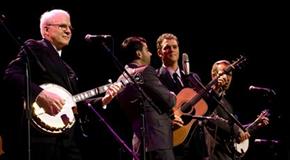Features
Bluegrass Awards, Performances Come To N.C.
Monroe and his band, the Bluegrass Boys, forged their own style, combining church music, black music and old-time music to make a “high, lonesome sound” that became known as bluegrass.
“When Bill Monroe added the North Carolina boy, Earl Scruggs, and Earl’s particular brand of three-finger banjo, that’s when bluegrass really solidified,” said Raleigh musician Joe Newberry. “ … That’s what a lot of people would call the big bang of bluegrass.”
Next week, bluegrass music will once again be anchored in North Carolina, with the World of Bluegrass on Tuesday through Sunday in downtown Raleigh.
The celebration begins Tuesday, when the International Bluegrass Music Association’s three-day business conference begins at Raleigh’s convention center. The IBMA’s awards ceremony, hosted by the Grammy-winning Steep Canyon Rangers, will be held Thursday at Memorial Auditorium.
It’s a new venue for the music awards show, which has been held in Nashville since 2005. IBMA says it will stay in Raleigh for at least three years.
The music continues through the weekend with ticketed amphitheater performances. Friday night will spotlight a band of bluegrass stars Sam Bush, Jerry Douglas, Bela Fleck, Del McCoury, Tony Rice and Mark Schatz. Saturday’s headliners will be Steve Martin and the Steep Canyon Rangers, featuring Edie Brickell. There will also be four stages of music along a closed street.
Two sounds define bluegrass more than any others: the three-finger banjo playing that’s syncopated and rhythmically complicated and the vocals of a high tenor male, known as the “high lonesome,” said Barry Poss of Durham, an IBMA founder who also founded Sugar Hill Records. Think Scruggs and Flatts’ performance of the theme to the television “The Beverly Hillbillies.” Or the music from the movie “Bonnie and Clyde.”
Old-time music was performed for dances and other social settings so it’s more of an ensemble effort. In bluegrass, each instrument gets a chance to show off and improvise. Also, bluegrass was once part of the country music sound, but fell by the wayside when country became more mainstream, Poss said.
“Even a casual listener can hear the differences in the way tunes and songs are played,” said Newberry, who is nominated for song of the year along with Eric Gibson for “They Called It Music,” performed by the Gibson Brothers.

One of the turning points for bluegrass came when radio stations in Atlanta and Charlotte figured out they could sell products by bringing musicians into the studio to play live, said George Holt, director of performing arts and film program at the N.C. Museum of Art. “There was a very quick evolution from music being a little more folksy and social dance music to more polished, more performance-oriented music,” he said.
Raleigh officials expect about 60,000 people to attend Wide Open Bluegrass, said Loren Gold, executive vice president with the Greater Raleigh Convention and Visitors Bureau and co-chairman of the local organizing committee.
And they say the bluegrass events will have a higher profile in Raleigh than they did in Nashville.
“We took it from the angle, you’re in a shadow there,” Gold said of country music’s hold on Nashville. “Come to Raleigh and own the town.”
North Carolina is the right place for the awards, Holt said.
“My sense is that North Carolina is arguably the most bluegrass-centric state in the country,” he said. “I think the audience for the music here is bigger than all others. … I think the IBMA showcase will probably be a bigger deal and even more appreciated here than it may have been in Nashville.”